Godaddy vs Hostgator: Final verdict
Looking over GoDaddy vs. HostGator, it’s clear why both hosts are so popular. They have both hosted millions of
websites that run on WordPress for decades, building up a loyal customer base.
-
HostGator (Overall grade: 8.1)
proves to be a strong choice for users looking for advanced support options and flexibility. It offers dedicated, cloud, and reseller hosting with extensive features that include SSH access, a comprehensive CPanel, and free content transfers. HostGator shines in user management with defined roles and permission settings, and its reliable customer support across multiple platforms including live chat, phone, and even Twitter. Users benefit from HostGator’s competitive pricing and valuable inclusions, such as unmetered bandwidth and full root access in VPS hosting plans.
GoDaddy (Overall grade: 7.8)
excels in performance with minimal downtime and rapid server response times. It offers a variety of hosting plans, including managed WordPress hosting with daily backups and enhanced security measures like Web Application Firewalls and malware scans. GoDaddy’s strength lies in ease of use with its user-friendly control panel and optional setup tools, as well as automatic daily backups and 24/7 support with SMS options. However, some users find their customer support inconsistent, and renewal costs can be high compared to the initial discounted rates. Overall, GoDaddy’s performance metrics and features make it a reliable choice for users prioritizing speed and uptime.
 Overall grade:7.8 |
 Overall grade:8.1 |
|
|---|---|---|
| Uptime and Availability | 8.6 | 7.6 |
| Hosting Performance | 8.1 | 7.7 |
| Hosting Security | 8.6 | 8.6 |
| Price | 7.7 | 8.2 |
| Hosting Features | 7.1 | 7.5 |
| Ease Of Setup | 8.7 | 8.7 |
| User Management | 5.0 | 7.8 |
| Customer Support | 8.2 | 8.6 |
| User feedback | 3.9/5 | 3.6/5 |
Hosting types offered
Both platforms provide a variety of hosting types, each designed to meet the different needs of users.
 |
 |
|
|---|---|---|
| Shared hosting | ||
| Cloud hosting | ||
| WordPress hosting | ||
| Ecommerce hosting | ||
| VPS hosting | ||
| Dedicated hosting |
Although both offer a variety of hosting plans tailored to different needs, in
certain cases, one platform may prove to be more suitable.
Detailed comparison
Uptime and availability
Evaluates the average uptime statistics, uptime guarantee and overall availability of the hosting
provider
Score Components:
- Uptime percentage (30%): evaluates the uptime statistics in given period of time
- Uptime guarantee (20%): Assesses if the platform offers an uptime guarantee and
whether the actual uptime matches the promised guarantee. - General performance (25%): Evaluates how fast is the average response time and overall
it’s stability. - Responsiveness (10%): Adaptability to different devices and screen sizes.
- Availability (25%): Reflects the total downtime and number of outages.
 8.6
8.6
 7.6
7.6
Winner GoDaddy: Consistently high uptime and rapid response times make GoDaddy the top choice for hosting.
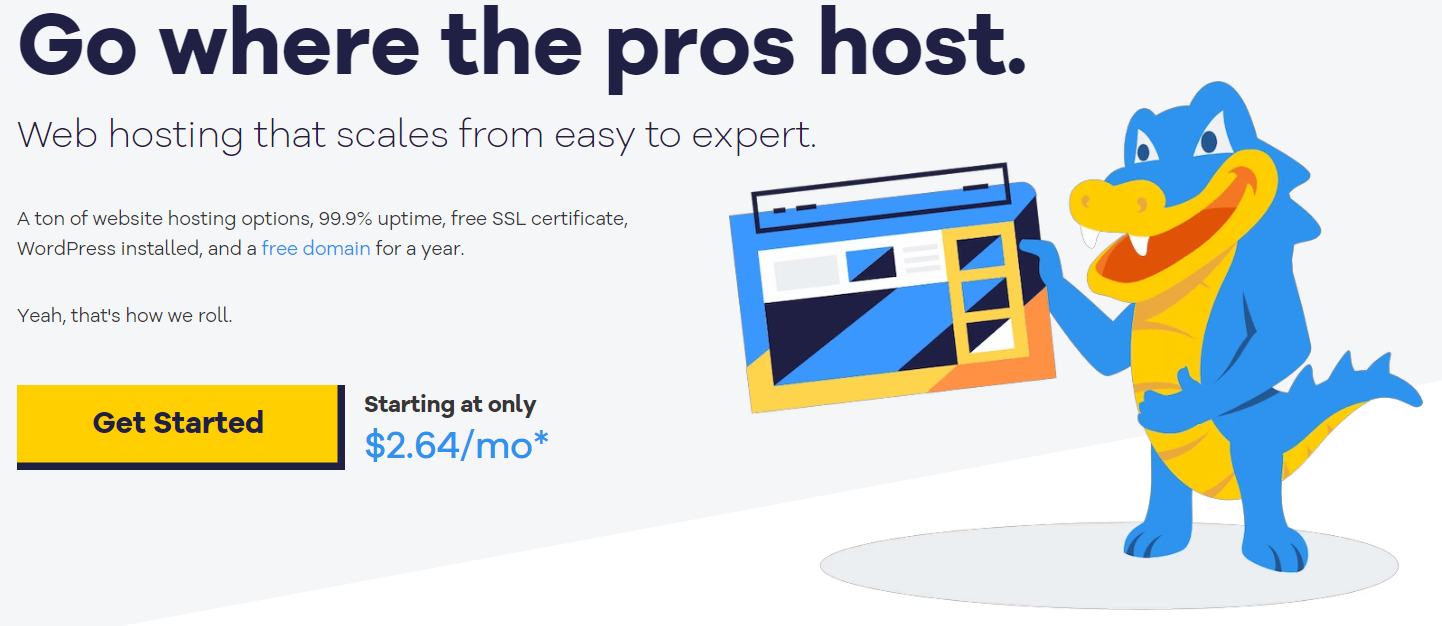
GoDaddy offers a 99.9% uptime guarantee and has exceeded this with a 99.98% uptime rate during testing. It experienced only three brief outages totaling 16 minutes over two months. Server response time averages 341ms, significantly better than the 600ms shared hosting average. Even its global load times are efficient, with an impressive 481ms load time from the US.

HostGator also guarantees 99.9% uptime, translating to about 8.76 hours of potential downtime per year. Despite this commitment, some competitors offer higher guarantees. HostGator provides 24/7/365 support via telephone and Live Chat. While it offers solid hosting services, its competitors’ higher uptime rates provide a strong alternative.
GoDaddy’s performance in uptime and server response times outshines HostGator. The minimal downtime and faster load times, coupled with their effective global performance, make GoDaddy a more reliable hosting provider. Although HostGator offers accessible support, GoDaddy’s superior metrics place it ahead in reliability and performance.
Which one has better hosting performance?
Score Components:
- Hosting speed (30%): This includes SSD quality, Load times, PageSpeed score ranges,
additional information on website speed, built-in plugins for performance enhancement, available caching
methods, and CPU/RAM options - CDN (20%): Considers whether CDN is available or not, whether it’s free or paid, and
the quality of the CDN service - Available data centers (30%): Evaluates the number of data centers and their locations
globally. - Scalibility (20%): Looks at whether elastic scaling is available, the process required
to scale (manual upgrade vs. automatic scaling), the presence of dedicated servers, and the costs
associated with scaling.
 8.1
8.1
 7.7
7.7
🏆 Winner
GoDaddy: Offers faster performance and more extensive features.
GoDaddy and HostGator both ensure their users get strong hosting services, but their general performance has some key differences. GoDaddy stands out with up to 40% faster server response times thanks to optimized servers and superior SSD storage options. HostGator also offers unmetered bandwidth and solid performance but doesn’t specify the same levels of optimization. Both providers have a 99.9% uptime guarantee, but GoDaddy boosts website speed further with global data centers in North America, Europe, and Asia-Pacific, compared to HostGator’s integration with Cloudflare CDN for improving page load speeds.
Website Speed
GoDaddy typically delivers faster website speeds due to their optimized server setups and NVMe storage, which ensures quicker data access times. The use of global data centers reduces page load times for users worldwide. HostGator, while providing reliable page speeds via Cloudflare CDN and SSD storage, may not match GoDaddy’s heightened speed on a global scale, as GoDaddy’s infrastructure is more extensively distributed.
Scalability
Both hosting services offer scalability, but the approach differs. GoDaddy provides various plans with dedicated resources, and users can upgrade to plans like Web Hosting Plus for high-traffic sites. VPS hosting options also allow for increased resources with specified costs. HostGator’s scalability is built into their tools and plans, which let users scale resources as needed by upgrading their current plan. The details on elastic scaling or automatic adjustments are not clear for either host, requiring users to manage their upgrades actively.
Which one has better security features?
and regulatory requirements
Score Components:
- Technical security measures (40%): This includes encryption, firewalls, DDoS
protection, secure configurations, server monitoring, access control and availability of security addons
(e.g Sitelock security). - Operational security measures (30%): Encompasses data privacy, backups and data
redundancy. - Compliance and certifications (20%): Adherence to legal and regulatory requirements
(e.g., GDPR, HIPAA) and possession of certifications (e.g., ISO 27001, SOC 2). - Business and reliability (10%): Factors in the provider’s reputation, uptime
guarantees, and customer support.
 8.6
8.6
 8.6
8.6
🏆 Winner GoDaddy: GoDaddy and HostGator offer comparable hosting services, but GoDaddy edges out in some technical features and customer support.
Both GoDaddy and HostGator, have notable differences in their approaches to technical and operational
security, as well as in their compliance with regulations.
Technical security measures:
GoDaddy and HostGator provide robust SSL options. GoDaddy’s AutoSSL offers a convenient, automatically renewing option. HostGator offers free SSL with strong encryption and browser recognition, but GoDaddy offers a managed SSL service where experts handle all aspects. Both support the latest PHP versions, with GoDaddy providing long-term support for PHP 7.4 and 8.0, while HostGator supports PHP 8.2. GoDaddy’s additional options for firewall, malware scanning, and DDoS protection provide an enhanced security environment, whereas HostGator’s SiteLock service is a valuable resource for malware detection and removal.
Operational security measures:
GoDaddy offers daily backups and a Web Application Firewall (WAF), enhancing website security operations. HostGator’s CodeGuard offers daily backups but lacks the WAF feature. GoDaddy’s global data centers ensure faster load times, while HostGator’s Cloudflare CDN also aids in faster page loads. Both companies provide round-the-clock customer support, but GoDaddy’s inclusion of SMS support offers an additional convenience.
Compliance and certifications:
Both GoDaddy and HostGator comply with GDPR regulations, ensuring the handling of personal data according to specified requirements. GoDaddy takes additional steps by not only training staff on data protection but also offering detailed privacy policies. HostGator’s PCI compliance covers server aspects and configurations, whereas GoDaddy offers PCI-certified products like WooCommerce Hosting. HIPAA compliance information is not specified for either provider.
 |
 |
|
|---|---|---|
SSL certificate |
AutoSSL, Managed SSL |
Free SSL, Positive SSL |
Additional security features |
WAF, malware scanning, DDoS protection |
SiteLock Security |
PHP versions |
PHP 7.4, 8.0 |
PHP 8.2 |
GDPR compliance |
Yes |
Yes |
HIPAA compliance |
Not specified |
Not specified |
PCI compliance |
Yes, PCI-certified products |
Server and user requirements |
Hosting features
Score Components:
- Domains (20%): Assesses the availability of a free domain, domain purchase options, and
pricing - Email (15%): Considers if the provider offers full email hosting, or is reselling
third-party service, and if the email is only transactional or not - Website builder (15%): Checks if website builder is available, and it’s user
friendliness and overall the level of customization allowed. - Staging environment (20%): Determines if a staging environment is available, allowing
for testing changes before going live. - FTP & SFTP accounts (10%): Evaluates if and how easily users can access FTP and
SFTP accounts - Git and SSH access (20%): Assess whether Git is integrated into the hosting service and
if SSH access is provided
 7.1
7.1
 7.5
7.5
🏆 Winner
HostGator: Offers a wide array of robust hosting features and enhancements.
GoDaddy and HostGator both present a range of hosting plans catering to diverse needs. GoDaddy provides an easy-to-use website builder, free domain for the first year, and various performance tiers. It stands out with features such as free SSL certificates, unmetered bandwidth, and WordPress pre-installed with managed hosting plans. On the other hand, HostGator’s standout features include an intuitive cPanel, robust email services, and advanced capabilities for more experienced users. HostGator includes free SSL for its users, cPanel with Unix shell access, and supports various programming languages like Python and Perl, catering to developers looking for customization options.
One of the main considerations is the inclusion of additional perks and supportive resources. GoDaddy offers automated daily backups, 24/7 support, and PCI compliance, which can be particularly beneficial for small businesses concerned with security and reliability. HostGator, meanwhile, includes a DDoS scrub center and Object Caching, which enhances website performance and security. Both providers offer free domains and SSL certificates for the first year, but HostGator’s offering includes more advanced features like full root access for VPS hosting and free content transfers. These factors might sway users who need higher control and advanced functionalities.
 |
 |
|
|---|---|---|
Free domain |
Yes, for the first year |
Yes, for the first year |
Free SSL |
Yes |
Yes |
Email hosting |
Yes |
Yes |
Website builder |
Yes |
Yes |
Staging environment |
Yes (Managed WordPress) |
Yes (Business Plan) |
FTP & SFTP accounts |
Yes |
Yes |
Git and SSH access |
No |
Yes |
Free backup |
Yes |
Yes (first year) |
Money back guarantee |
Yes, 30 days |
Yes, 30 days |
a location.
As a result in rare cases the features mentioned here can differ from the ones you see on their websites.
Both providers support a range of users from beginners to experts with user-friendly website builders and WordPress staging areas. However, in terms of developer tools, both GoDaddy and HostGator offer robust options including SSH access, support for multiple programming languages, and Git for version control, thus appealing to developers looking for advanced capabilities.
Email services:
GoDaddy offers robust email hosting with free email accounts in all their plans. Their email services include essential transactional capabilities with tools for setting up email campaigns. HostGator also provides extensive email hosting with unlimited email accounts and features that support transactional emails and full access to email campaign management. Additionally, both providers offer integration with third-party services like Google Workspace and Outlook, enabling users to expand their email functionalities seamlessly.
Price
Score Components:
- Plan value (40%): What each pricing tier offers.
- Transparency and clarity (30%): Clearness of pricing structures.
- Flexibility of plans (20%): Range of options to suit different budgets.
- Hidden costs (10%): Additional expenses not included in the plan.
 7.7
7.7
 7.4
7.4
🏆 Winner
GoDaddy: GoDaddy offers a variety of pricing plans with appealing features such as free SSL certificates and generous storage capacities.
Evaluating the pricing of plans among various hosting providers can be complex due to their differing pricing and renewal strategies. Additionally, certain plans require annual commitments, which adds to the difficulty of making comparisons. The prices listed are based on monthly commitments; plans requiring annual commitments are indicated. Additionally, although some providers offer identical plans for WordPress and shared hosting, we have created separate tables for each to enhance clarity.
The comparison between GoDaddy and HostGator showcases notable differences. GoDaddy provides more flexible options, especially in terms of introductory prices and long-term commitments. It offers a range of features including free SSL certificates, WordPress migration tools, and a variety of storage capacities. HostGator, despite offering unmetered bandwidth and higher storage levels, tends to have steeper pricing in the long term. GoDaddy also includes more comprehensive features in its baseline plans such as email and domain registration, making it a more attractive option for most users.
 |
 |
|---|---|
|
Managed WordPress Basic $12.99
1 website, 10 GB NVMe storage, Free domain, Free SSL, WordPress pre-installed, AI creation tool, Value for price:8.0
|
Baby Plan $21.99
Up to 2 websites, 20 GB storage, Unmetered bandwidth, Phone & Chat support, Basic email included, Value for price:7.5
|
|
Managed WordPress Deluxe $13.99
1 website, 20 GB NVMe storage, Free domain, Free SSL, WordPress pre-installed, AI creation tool, Value for price:8.5
|
Business Plan $27.99
Up to 3 websites, 40 GB storage, Unmetered bandwidth, Phone & Chat support, Basic email included, Value for price:7.8
|
|
Managed WordPress Ultimate $15.99
1 website, 30 GB NVMe storage, Free domain, Free SSL, WordPress pre-installed, AI creation tool, Value for price:9.0
|
Pro Plan $34.99
Up to 5 websites, 100 GB storage, Unmetered bandwidth, Phone & Chat support, Basic email included, Value for price:8.0
|
 |
 |
|---|---|
|
Web Hosting Economy $5.99
1 website, 25 GB NVMe storage, Shared RAM and vCPU resources, Free domain, Free email, Free SSL Value for price:7.7
|
Hatchling Plan $17.99
Single website, 10 GB SSD storage, Unmetered bandwidth, Basic email, Free domain 1st year, Chat Value for price:6.5
|
|
Web Hosting Deluxe $7.99
10 websites, 50 GB NVMe storage, Shared RAM and vCPU resources, Free domain, Free email, Free, Value for price:8.2
|
Baby Plan $21.99
Up to 2 websites, 20 GB SSD storage, Unmetered bandwidth, Basic email, Free domain 1st year, Phone Value for price:6.8
|
|
Web Hosting Ultimate $12.99
25 websites, 75 GB NVMe storage, Shared RAM and vCPU resources, Free domain, Free email, Free, Value for price:8.5
|
Business Plan $27.99
Up to 3 websites, 40 GB SSD storage, Unmetered bandwidth, Basic email, Free domain 1st year, Phone Value for price:7.0
|
|
Web Hosting Maximum $17.99
50 websites, 100 GB NVMe storage, Shared RAM and vCPU resources, Free domain, Free email, Free, Value for price:8.8
|
N/A |
 |
 |
|---|---|
|
VPS 1 vCPU / 2GB RAM $8.99
1 vCPU core, 2 GB RAM, 40 GB NVMe SSD storage, Snapshot backups, Linux only, cPanel or Plesk Value for price:7.8
|
Snappy 2000 $91.99
2 GB RAM, 2 Core CPU, 120 GB SSD storage, Unmetered bandwidth, cPanel & WHM, Billing software, Value for price:6.5
|
|
VPS 2 vCPU / 4GB RAM $17.99
2 vCPU cores, 4 GB RAM, 100 GB NVMe SSD storage, Snapshot backups, Linux or Windows compatible, Value for price:8.2
|
Snappy 4000 $131.95
4 GB RAM, 2 Core CPU, 165 GB SSD storage, Unmetered bandwidth, cPanel & WHM, Billing software, Value for price:7.0
|
|
VPS 4 vCPU / 8GB RAM $34.99
4 vCPU cores, 8 GB RAM, 200 GB NVMe SSD storage, Snapshot backups, Linux or Windows compatible, Value for price:8.5
|
Snappy 8000 $161.99
8 GB RAM, 4 Core CPU, 240 GB SSD storage, Unmetered bandwidth, cPanel & WHM, Billing software, Value for price:7.5
|
|
VPS 4 vCPU / 16GB RAM $44.99
4 vCPU cores, 16 GB RAM, 200 GB NVMe SSD storage, Snapshot backups, Linux or Windows compatible, Value for price:8.8
|
N/A |
As a result in rare cases the prices displayed here can differ from the ones you see on their websites.
Enterprise plans
GoDaddy’s Web Hosting Maximum plan stands out for enterprises with 100 websites, 100 GB NVMe storage, and unlimited SSL for all websites. It offers a competitive price point and includes a free domain and email, making it a cost-effective choice. HostGator’s equivalent
Godaddy vs Hostgator: Ease of setup
platform.
Score Components:
- Site migration (25%): Assesses whether the provider offers tools for site migration,
either automated or manual, and whether these services are free or require a fee. - Admin panel usability (35%): Evaluates the type of admin panel provided, such as the
standard cPanel or a custom solution, focusing on its accessibility and user-friendliness for both
technical and non-technical users. - Setup features (20%): Examines the availability and ease of use of various setup
features, including FTP accounts, file managers, email account setup, PHPMyAdmin, and easy CDN
configuration. - Help center quality (20%): Measures the quality and accessibility of the provider’s
help center resources, including articles and tutorials.
 8.7
8.7
 8.7
8.7
🏆 Winner
GoDaddy: GoDaddy offers an easy setup process and comprehensive support options for users.
GoDaddy provides an industry-standard cPanel, known for its reliability and user-friendly interface. This control panel allows both beginners and advanced users to manage their websites effortlessly. The inclusion of one-click setup for popular applications like WordPress simplifies the process, eliminating many technical hurdles. Additionally, GoDaddy’s automatic daily backups ensure that data recovery can be performed easily, enhancing user confidence.
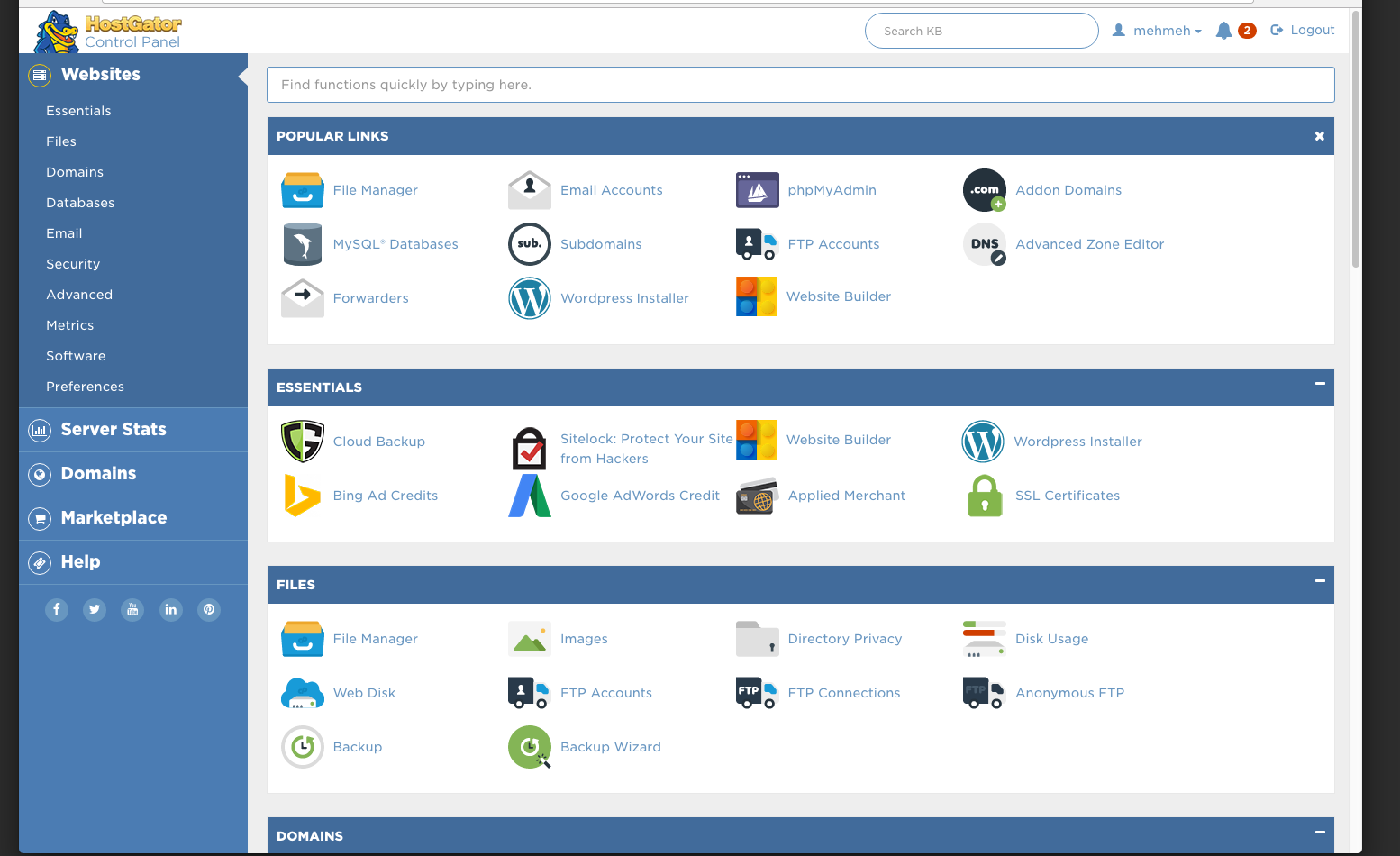
HostGator also presents a user-friendly experience with its control panel designed for simplicity. The single dashboard approach allows users to manage all aspects of their online presence seamlessly. HostGator’s one-click installs for over 75 open-source scripts, along with pre-installed WordPress hosting, make it an attractive option. However, the dual offerings from GoDaddy—both a standard cPanel and additional user-friendly setup tools—make GoDaddy’s admin panel slightly more advantageous.
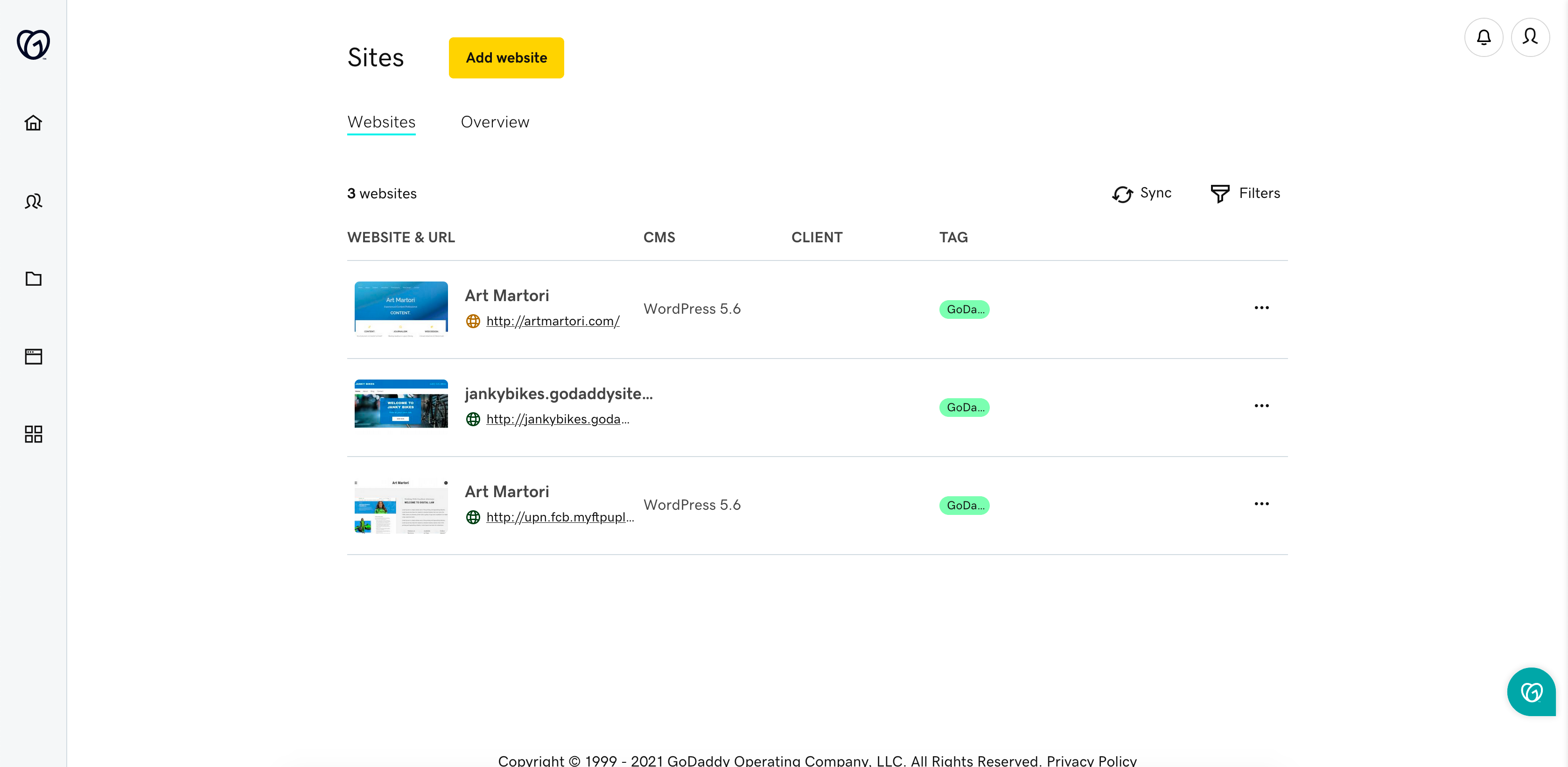
Both GoDaddy and HostGator offer free migration tools to help users transition their websites. GoDaddy provides a free tool specifically for migrating WordPress sites, which simplifies the process significantly for users of the most popular content management system. HostGator also offers free migration services, without specifying the type of websites covered. These services ensure that transferring from one host to another is hassle-free, giving both hosts an edge for users looking to change providers.
Both hosting providers offer extensive help centers. GoDaddy boasts a 24/7 support system via phone and chat, backed by a comprehensive FAQ section and numerous help articles. You can even get assistance from their GoDaddy Guides, regardless of whether you’re a customer. HostGator, on the other hand, provides 24/7 support via multiple platforms, including Twitter. Their KnowledgeBase, blog posts, YouTube tutorials, and webinars make finding answers straightforward. While both have robust support systems, the additional personal touch offered by GoDaddy Guides tilts the balance slightly in GoDaddy’s favor.
User management
accessibility.
Score Components:
- Role customization (40%): Flexibility in creating and defining user roles and
permissions. - Ease of management (30%): User interface and tools for managing users.
- Access control (20%): Effectiveness of access control measures for different user
levels. - Scalability (10%): Ability to manage a growing number of users efficiently.
 5.0
5.0
 7.8
7.8
🏆 Winner HostGator: Streamlined and flexible user management with detailed permission settings.
When comparing the user management features of GoDaddy and HostGator, HostGator stands out for its detailed and precise allocation of user roles and permissions. GoDaddy’s user management and roles information were not explicitly available, which leaves its flexibility in user role creation and definition somewhat ambiguous. HostGator, by contrast, offers clear distinctions among user roles – Primary Contact, Administrative Contact, and Technical Contact – each with specific permissions. This structured approach ensures that users can be assigned roles that precisely match their responsibilities, enhancing the flexibility and control over user management within the hosting platform.
In terms of user interfaces and tools, HostGator provides an intuitive and accessible Customer Portal for managing users. The process to add or manage users, outlined in clear steps, makes it straightforward to adjust user roles and permissions. On GoDaddy, details about the user interface for managing users were not provided, making it challenging to evaluate its ease of use compared to HostGator’s well-documented and streamlined management tools.
The effectiveness of access control measures is a crucial factor in hosting services. HostGator’s capability to manage a growing user base is evident through its detailed role-specific permissions, enabling efficient user management even as the number of users increases. The Primary Contact can oversee all aspects, from account changes to purchasing new products, while Administrative and Technical Contacts have tailored permissions that align with their roles. This segmentation ensures secure and effective management of access control. For GoDaddy, without specific information on its user management features, it’s difficult to assess how effectively it manages access control challenges or supports scalability.
HostGator User Roles Table:
| Role | Description | Access highlights |
|---|---|---|
| Primary Contact | Has full authority to make changes to the account. | Edit account holder details, payment info, add/edit/delete users, purchase/manage/renew products. |
| Administrative Contact | Ideal for administrative tasks on the account. | Edit payment info, add/edit/delete users, purchase/manage/renew products, edit WHOIS admin or tech info. |
| Technical Contact | Focused primarily on product maintenance. | Manage and renew products, edit WHOIS admin or tech info. |
Customer support
hosting provider.
Score Components:
- Support communication channels (30%): Measures the variety of customer support types
provided (live chat, chatbot, email, phone, etc.) - Availability (20%): Assesses the availability hours for each channel, including 24/7
support options. - Technical support quality (30%): Assesses whether the provider offers comprehensive
technical support, including hardware upgrades (e.g., HDD to SSD), software installations, and web
server configuration changes. - Enterprise support (20%): Checks if there are dedicated or priority support services
for enterprise-level customers.
 8.2
8.2
 8.6
8.6
🏆 Winner HostGator: Offering consistent customer satisfaction and a wide range of support options.
 |
 |
|
|---|---|---|
| Phone Support | ||
| Live Chat Support | ||
| Chatbot | ||
| Email/Ticket Support | ||
| Enterprise Support (Dedicated agent, Priority support) |
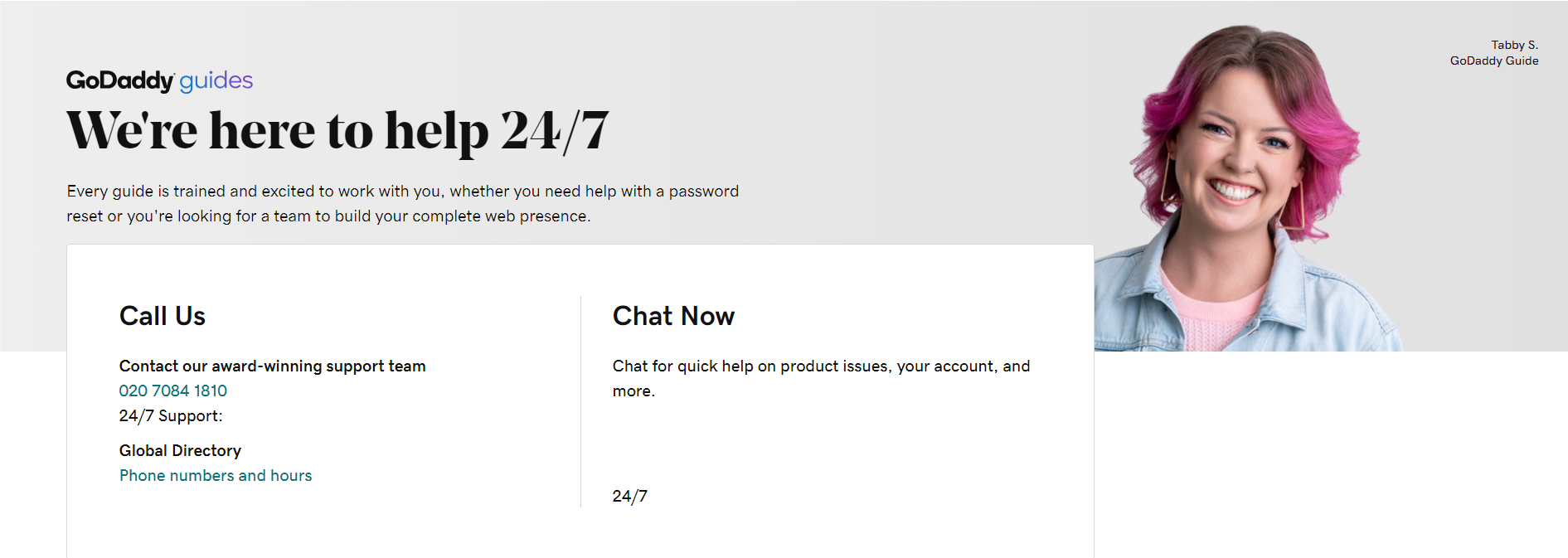
GoDaddy and HostGator both offer extensive customer support, yet their approaches vary. GoDaddy provides 24/7 support primarily via phone and email, with a free WordPress migration tool and automatic daily backups as added perks. It also features a vast knowledgebase with guides, videos, and an active user community. However, live chat is restricted to users on the US subdomain.
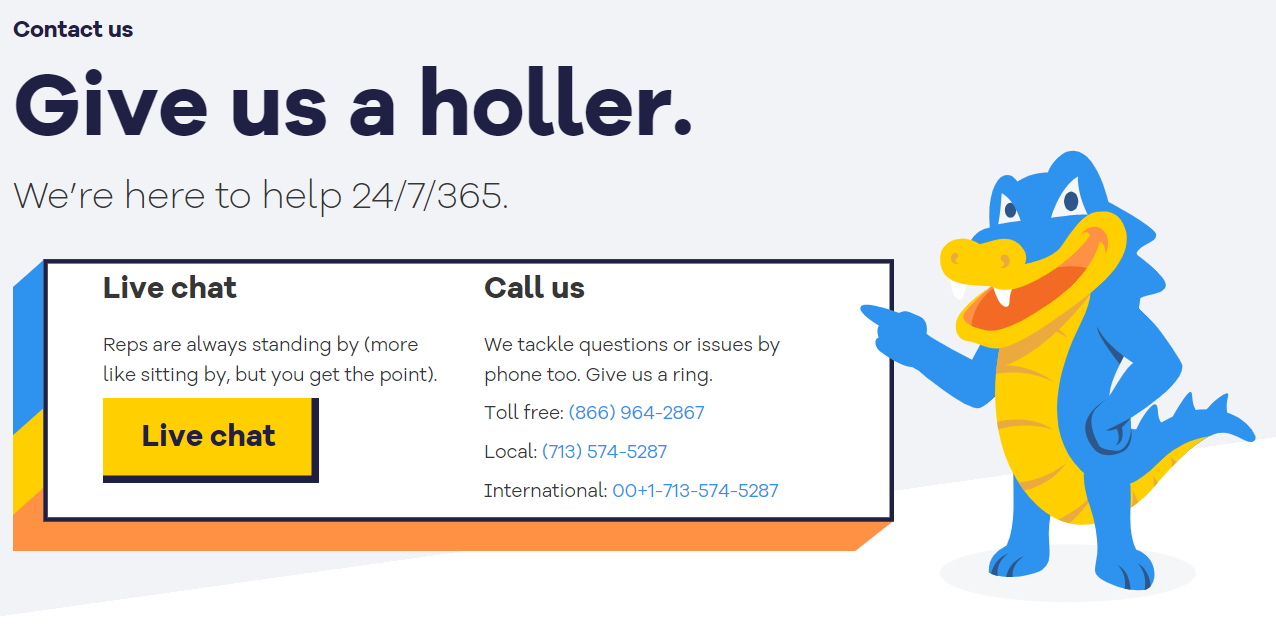
HostGator, on the other hand, excels with round-the-clock support through multiple channels, including live chat, phone, and Twitter. Its knowledgebase, blogs, YouTube tutorials, and Facebook community provide a thorough range of resources. HostGator goes a step further with specialized webinars and promotional offers, which enhance overall user experience. With a slightly higher customer satisfaction score, HostGator demonstrates a broader and more robust support ecosystem.
Godaddy vs Hostgator: User feedback
GoDaddy generally receives praise for its ease of use, affordability, comprehensive service offerings, and user-friendly interface, making it a popular choice for domain registration and basic web hosting. Many users appreciate the ability to purchase domains, web hosting, email services, and other digital products all in one place, along with frequent discounts for new customers. However, customer service experiences are inconsistent; while some users find it helpful and responsive, others report long wait times and unknowledgeable support staff. Additionally, recurring issues include high renewal costs, persistent upselling, and occasional technical difficulties.
HostGator offers affordable, user-friendly web hosting services, which are appealing to both beginners and budget-conscious users. Key strengths include competitive pricing, reliable uptime, free SSL certificates, and efficient customer support. However, customers have reported issues such as slow server performance, aggressive upselling, rising renewal prices, and limited advanced features. While the overall experience can be positive, especially for small-scale or low-traffic sites, technical support responsiveness and server speed occasionally fall short, impacting the user experience.
Godaddy vs Hostgator: FAQ
Are both platforms suitable for beginners?
Both GoDaddy and HostGator offer features and tools that make them suitable for beginners. GoDaddy provides an easy-to-use industry-standard cPanel and a user-friendly control panel with one-click setup tools for popular applications like WordPress. HostGator also offers a simplified control panel and a single dashboard interface, making it easy for beginners to manage their websites. Overall, both platforms cater well to those new to web hosting.
Which platform offers better customer support?
Both GoDaddy and HostGator offer extensive customer support, but their approaches differ slightly. GoDaddy provides 24/7 support via phone and email with a comprehensive knowledgebase and user community, whereas live chat is more restricted. HostGator excels with 24/7 support through multiple channels, including live chat, phone, and Twitter, and provides a thorough knowledgebase, blogs, YouTube tutorials, and webinars. HostGator’s broader and more robust support ecosystem slightly edges out GoDaddy.
Which hosting service offers more scalability options for growing websites?
Both GoDaddy and HostGator offer scalable hosting solutions, but their approaches differ. GoDaddy provides various plans with dedicated resources and options to upgrade to higher plans like Web Hosting Plus for high-traffic sites. HostGator allows users to scale resources within their current plans, offering flexibility in scaling as needed. Overall, both platforms provide substantial scalability options, but they require users to manage their upgrades actively.
Which platform is better suited for hosting WordPress websites?
Both GoDaddy and HostGator offer managed WordPress hosting services with features like free domains for the first year and daily backups. The choice between them depends on specific needs such as performance, security, and additional features. As both platforms provide strong solutions for WordPress hosting, they are effectively tied in this category.
Which service is more suitable for hosting a high-traffic website?
HostGator is generally more suitable for hosting high-traffic websites due to its provision of dedicated servers with high-performance CPUs and RAM options. While GoDaddy also offers scalable solutions and fast server response times, HostGator’s dedicated hosting plans cater specifically to high-traffic needs, providing more robust resources and performance for demanding websites.
The making of this blog
We followed a clear, step-by-step process to write and research this article.








